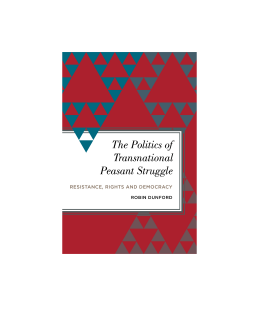
Additional Information
Book Details
Abstract
New waves of land grabbing are working to dispossess peasants in both the Global South and the Global North. But peasants are fighting back. They have come together to contest dispossession through place-based and transnational forms of activism. In so doing, they have articulated a demand for food sovereignty. They claim that a democratically organized food system in which smallholder producers produce their own food on their own territory can feed the world whilst cooling the planet.
This book explores practices of peasant resistance. Its aim is to show how grass roots peasant activists have been able to demand transnational social and political change. In the process, the book examines the grassroots forms of activism that enable peasants to reclaim land upon which to work and from which to live. It explores how diverse grass roots movements have been able to connect and unite in order to contest transnational dynamics of oppression. Moreover, it discusses how practices of peasant activism transform how we think, and ought to think, about human rights and global democracy. By also highlighting the problems that peasants continue to face, the book indicates that the future of sustainable peasant livelihoods depends on the will of global organizations and transnational society to not just listen to the voices of peasant activists, but to respond to them too.
In this thoughtful and compassionate book, Robin Dunford explores contemporary peasant movements as a case study in effective transnational resistance. Against the background of increasing planetary slummification, Dunford addresses a number of key theoretical debates about autonomous democratic mobilization, arguing that we must heed the practical lessons of those engaged in the quest for planetary food sovereignty.
Nicholas Kiersey, Assistant Professor of Political Science, Ohio University Chillicothe
Dunford shows how organized peasants use 'Left arts of government' to construct a collective peasant identity, a collective analysis of the rural world, a common demand for food sovereignty, and diverse processes to build peasant autonomy and processes from below.
Peter Rosset, Professor and Researcher, El Colegio de la Frontera Sur (ECOSUR), Mexico
Robin Dunford’s book demonstrates the efforts of grassroots mobilizations to reimagine human rights and democratic politics theoretically and politically. This nuanced and carefully argued book makes a powerful case for recalibrating contemporary debates on human rights in light of the empirical evidence on the ground, and shows that human rights politics are neither only ever minimalist, individualist, neoliberal and empty but can also be collective, non-market led and emancipatory.
Sumi Madhok, Associate Professor, Gender Institute, London School of Economics
Robin Dunford is Lecturer in Humanities at the University of Brighton
This philosophically engaging and accessible book offers an innovative take on prospects for global democratic transformation. By grounding his reflections in actually-existing struggles, Dunford makes an important departure from those who think about political theory only in relation to abstract categories and values, offering new perspectives on the political possibilities and limits of human rights.
Lara Montesinos Coleman, Lecturer in International Relations and International Development, University of Sussex
Table of Contents
| Section Title | Page | Action | Price |
|---|---|---|---|
| Contents | 9 | ||
| Acknowledgements | 11 | ||
| Chapter One: Introduction | 15 | ||
| Chapter Two: Peasant Dispossession and the Emergence of the Agro-Industrial Food Regime | 27 | ||
| Chapter Three: Peasant Resistance | 57 | ||
| Chapter Four: Human Rights: Domination and Emancipation | 91 | ||
| Chapter Five: How Ideas Travel: Rights to Land, Rights to Food and Food Sovereignty | 125 | ||
| Chapter Six: Peasant Resistance and Global Democracy | 155 | ||
| Bibliography | 185 | ||
| Index | 199 |
